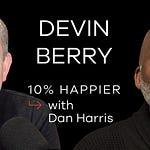What to do when the voice in your head is an asshole.
Sebene Selassie is an author and meditation teacher. She writes the popular newsletter remind me to love and her first book is called You Belong.
Jeff Warren is an author and meditation teacher. He writes the popular newsletter Home Base and is the coauthor, along with Dan, of a book called Meditation for Fidgety Skeptics. And he is the co-host of the mind/bod adventure pod.
Aaron Schultz aka DJ DRM has crisscrossed the globe for decades playing his own unique brand of dance music. Aaron is also a longtime meditator and Dharma practitioner in the Dharma Drum lineage of Chan Buddhism, and is a passionate devotee of GuanYin Bodhisattva.
Get ready for another Meditation Party at Omega Institute! This in-person workshop brings together Dan with his friends and meditation teachers, Sebene Selassie, Jeff Warren, and for the first time, Ofosu Jones-Quartey. The event runs October 24th-26th. Sign up and learn more here.
Episode cheatsheet
The big takeaway
Dan Harris is joined by meditation teachers Sebene Selassie and Jeff Warren for a practical and honest look at what to do when the mind is caught in self-criticism, rumination, or difficult emotions. The conversation explores how meditation—and life—can become an exercise in learning to meet whatever arises, including discomfort and distraction, with curiosity, patience, and the support of others.
You are not your thoughts: befriending the voice in your head
Key takeaways:
Befriend the mind’s wandering: It’s natural for your mind to get swept away, but the real skill is noticing this with interest, not judgment.
Sticky stories and intense emotions: Old narratives and strong feelings can feel overwhelming, but meditation offers tools like compassion, patience, and inquiry to loosen their grip.
The Five Hindrances: These classic Buddhist obstacles (craving, aversion, restlessness, sleepiness, and doubt) show up both on the cushion and in daily life—and seeing them clearly removes much of their power.
Community counts: Doing the inner work with others—spiritual friends, meditation groups, or supportive communities—can turbocharge healing and help you realize you’re not alone.










